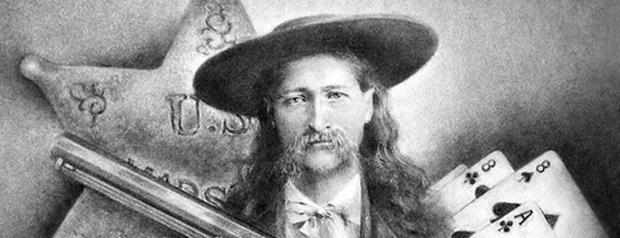Poker Legends of the Wild West
9 years ago

11 May
Poker is a game with a checkered and often wild history, and as such it deserves to have its tales, legends and myths told and re-told. Modern myths about online poker and suchlike - urban or otherwise - are all well and good, but the really juicy stuff comes when we delve deep into the past!
Poker Alice Ivers
Let’s start with the tale of ‘Poker Alice’ - a Wild West hero if ever there was one – who made her name as a frontier gambler at a time when most women in a card house or saloon were either prostitutes or madams in charge of them.
Poker Alice, however, was cut from a quite different cloth in almost every way. Although it’s not quite clear, she either hailed from Devonshire in England or was born to Irish immigrant parents in Virginia a couple of years later in 1853. Whatever her background, her elite boarding school upbringing was rudely interrupted when her family moved to follow the silver rush in Colorado.
Marrying a miner and enthusiastic gambler named Frank Duffield (the first of three marriages) she learned how to play and deal by accompanying him to the mine’s frequent poker games. She soon knew enough to sit in and win against the men.
This ability was to prove highly useful after her husband died in a mine explosion. In order to survive, she took to the gambling h alls and saloons across many states and she soon earned the nickname Poker Alice.

A very attractive woman, Alice Ivers would dress in the latest fashions of the day – paid for from her plentiful poker winnings – as well as enjoy smoking short, black stogies. Her character has been played in movies by the likes of Susan Sullivan and Elizabeth Taylor, although the latter movie was so far removed from the real-life Poker Alice that she was given a different surname entirely.
Being her husband appears to have been a very dangerous job indeed. Her second marriage came about after she saved Warren Tubbs’ life by shooting a knife-wielding miner in the arm with her .38 revolver – a gun she carried with her at all times.
When Tubbs died of pneumonia in 1910, legend has it that Poker Alice pawned her ring to pay for the funeral, then immediately after the burial played some more and won enough to buy the ring back.
Naturally, back in the days of the Old West, not quite as wild as the early 1800’s but still hugely ‘entertaining’, tall tales of gunslingers, cardsharps, and boozy brothels would be made even bigger in the telling. However, Poker Alice really does seem to have done all the things attributed to her!
Huge card wins - $6000 in a night, which back in those days was an absolute fortune – would pay for a new ranch, which in turn would starve her of cash and force a return to the gambling parlors. And at every stage of her adventures, the very attractive woman of the west would find an admirer.
Her third husband was George Huckert, a man she had hired to look after her homestead, and whom she had turned down for marriage several times. However, in her own words, and in a story retold countless times down the years, she finally acquiesced, saying:
I owed him so much in back wages
When Huckert passed away, Poker Alice opened her own ‘gambling parlor’ named ‘Poker’s Palace’, situated somewhere between Sturgis and Fort Meade where gambling, liquor, and ‘women who provided certain services for a fee’ shared the building.
A very funny story accompanies her buying the place according to some sources, with Alice going to her bank manager “for a $2,000 loan to build on an addition and go to Kansas City to recruit some fresh girls.”
“When I told the banker I'd repay the loan in two years, he scratched his head for a minute then let me have the money,” allegedly according to Alice herself.
In less than a year I was back in his office paying off the loan. He asked how I was able to come up with the money so fast. I took a couple chaws on the end of my cigar and told him, `Well, it's this way. I knew the Grand Army of the Republic was having an encampment here in Sturgis. And I knew that the state Elks convention would be here, too. But I plumb forgot about all those Methodist preachers coming to town for a conference'."

When one night a drunken soldier started a rumpus and began smashing up furniture, Alice pulled a rifle out and fired a warning shot. Unfortunately, the shot passed through two soldiers – killing one – and Alice found herself in jail on serious charges, although she was eventually acquitted after the incident was found to be an ‘accidental shooting’.
Her later years followed a similar pattern – the ‘Old West’ changing, and with it prohibition and various other laws emerging – and she was charged and jailed many times in the years leading to her death. Only one was serious though, at the age of 75, for that she was pardoned by the governor.
When Poker Alice Ivers died in 1930 of complications following a gall bladder operation in Rapid City, she was buried at St. Aloysius Cemetery in Sturgis, South Dakota and left behind her a legendary tale of poker, gambling and frontier-life – all the more amazing given she was a woman. As she is often quoted as having said at the tables:
Praise the Lord and place your bets. I'll take your money with no regrets."
The Riverboat Poker King
Around the same time that "Poker" Alice Ivers was starting her soon-to-be-legendary gambling life in the US, a riverboat gambler and hustler was already 15 years into his amazing career.
George H. Devol would become known as the Riverboat Poker King for his exploits up and down the Mississippi, a water-borne life of gambling which began at the age of just ten when he ran off and joined up with a steamer plying its trade along the grand waterway.
The riverboats became a gamblers paradise following the passing of many ‘city ordinances’ prohibiting gambling houses within city and town limits. The unregulated steamboat casinos and the card games they ran became George Devol’s life for the next 40 years, an often dangerous combination of card-sharp tactics and riverboat fires due to the over-working of boilers as the boats raced each other.
By 15 years of age, Devol had already mastered games such as seven up poker and many various frowned upon techniques of the card world. Having worked his way down to the US-Mexico border during the war, he was notorious for having taken plenty of soldiers pay packets through a combination of skill and trickery.
He wasn’t alone in this endeavour, however, with fellow legends of the West ‘Canada’ Bill Jones and ‘Big Alexander' also plying their trade amongst the new arrivals to the vast country, often playing on the naivety of those with money seeking a new life. Legendsofamerica.com includes an interesting – though not necessarily true! – tale of one of these encounters.

“It was during these riverboat gambling heydays that an interesting story occurred in 1832,” they write. “On a Mississippi steamboat four men were playing poker, three of which were professional gamblers, and the fourth, a hapless traveler from Natchez. Soon, the young naïve man had lost all his money to the rigged game. Devastated, the Natchez man planned to throw himself into the river; however, an observer prevented his suicide attempt, and then joined the card game with the 'sharps'.”
“In the middle of a high stakes hand, the stranger caught one of the professionals cheating and pulled a homemade knife on the gambler, yelling, "Show your hand! If it contains more than five cards I shall kill you!” When he twisted the cheater’s wrist, six cards fell to the table. Immediately, the stranger took the $70,000 pot, returning $50,000 to the Natchez man and keeping $20,000 for his trouble. Shocked, the Natchez man stuttered, "Who the devil are you, anyway?” to which the stranger responded, "I am James Bowie.”

Whether exactly true or not, almost every account from back in the wild West days of gambling has tales such as these – and it was in this kind of atmosphere that George Devol found his niche in life, a niche which would bring him a reputed $1million in winnings over his lifetime – a phenomenal sum of money 150 years ago.
As with Poker Alice, a religious fervour was involved at times. Although in Alice Ivers’ case it meant she refused to play or open her gambling house on a Sunday, for Devol it seemed to be a particular enjoyment he took in divesting gambling clergymen of their money, upon which he would apparently hand it back exclaiming as he did so:
Go forth and sin no more!”
As is often the case with gamblers of the old days and new, towards the end of his life Deveol found himself unable to continue his lifestyle on the Mississippi, retiring and selling copies of his memoirs ’40 years a Gambler on the Mississippi’, but even this was not enough to stave off the inevitable. George H. Devol died in 1896 with barely a cent to his name.

The Dead Man’s Hand
Now this poker legend really ought to be familiar to every card player and poker buff alive! The Dead Man’s Hand is supposedly the aces and eights which Wild Bill Hickok was holding when he met his untimely death at the cowardly hands of Jack McCall way back when in 1876.
However, let’s look a bit deeper into the myth behind the hand and the player who literally lost his head over it.
James Butler ‘Wild Bill’ Hickok, along with contemporaries such as Doc Holliday, “learned to hone their six-shooter skills at the same pace as their gambling abilities. Taking swift action upon the green cloth became part of the gamblers’ code – shoot first and ask questions later.” So writes Kathy Weiser for Legendsofamerica.com and the scenario can easily be imagined.
Before getting to Hickok, it’s worth mentioning the gruesome poker fable which is laid at Holliday’s door – perhaps true, perhaps one of the ‘legends’ Holliday allowed to circulate to enhance his reputation.

As the story goes, Holliday was involved in a poker game which included a local named as Ed Bailey in Fort Griffin, Texas. Bailey was apparently unimpressed with Holliday’s reputation as a sharpshooter and gambler and had taken to messing about with the ‘muck’ cards, “monkeying with the dead wood” as it is sometimes known.
Failing to heed Holliday’s warnings, of which there were a couple to stop his antics, the next time Bailey did it, Holliday simply raked in the pot as the rules of the time allowed for. Bailey went for his gun, but Holliday was quicker with his knife and “caught Bailey just below the brisket”. Basically he had ripped a hole in Bailey’s chest, the man quickly bleeding out over the poker table.
So much for Wild Bill’s companions of the day, but Hickok himself was no slouch when it came to threats and violence at the card table – and as the Holliday story shows, the line between outlaw and lawmaker was often a thin one, changeable at the whim of the local sheriff or town mayor.

So, as legend has it, Hickok was involved in a late-night card game with a man known as McDonald, when a particular pot reached huge proportions. When McDonald showed down his three jacks, Hickok replied, "I have a full house - aces over sixes," and threw his cards face down onto the table.
McDonald picked up Hickok’s hand, only to find a different hand, exclaiming:
I see only two aces and one six!”
"Here’s my other six,” said Hickok flashing his six-shooter pistol, and then produced his Bowie knife in the other hand, adding: "And here's my one spot."
McDonald, to his credit, took it well and saved himself a hero’s death by saying coolly:
That hand is good. Take the pot!”

As for the Dead Man’s Hand, it may well be legendary excess or it may be true, but whichever version is real, those fateful events which took place on August 2nd 1876 in the Nuttal and Mann’s Saloon in Deadwood, North Dakota have entered poker mythology.
Hickok was shot in the back of the head by Jack McCall, during a game of 5-card stud (despite the fact that Faro was the game of choice in those days) and the hand Hickok held was reputed to be the black aces and black eights – the Dead Man’s Hand.
As is the way with myth and legend, contemporary sources are hard to track down, and the first recorded version of Hickok’s holding didn’t appear until the 1926 publication of Frank Wilstach's book, Wild Bill Hickok: The Prince of Pistoleers— some half a century after Hickok's death.
Prior to this, if you count reasonably well-sourced Wikipedia articles as faithful enough to believe, “the earliest detailed reference to the "dead man's hand" was 1886, where it was described as a "full house consisting of three jacks and a pair of tens. Jacks and sevens are called the 'dead man's hand' in the 1903 Encyclopaedia of Superstitions, Folklore, and the Occult Sciences while Edmond Hoyle references the Dead Man's Hand as "Jacks and eights" in 1907.

Whatever the actual holding – and there are as many versions of the fifth card in Hickok’s hand as there are definitions of the hand itself – it is another one of poker’s legendary tales which enrich the game and its folklore.
My own preference is for the tale which says that McCall’s deadly attack actually interrupted the draw – Hickok’s 5th and final card never making it to the felt which ran red with his blood.






Comments
You need to be logged in to post a new comment